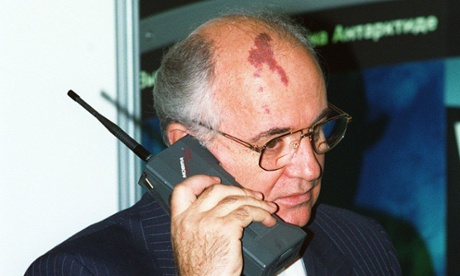
To the technology trade, I am what is known as an “early adopter” (translation: gadget freak, mug, sucker). I had a mobile phone in the mid-1980s, for example, when they were still regarded as weird. It was the size of a brick, cost the best part of a grand and exposed me to ridicule whenever I took it out in public. But I didn’t care because the last Soviet president, Mikhail Gorbachev, used the same phone and he was cool in those days. Besides, it had always seemed absurd to me that phones should be tethered to the wall, like goats. I still have that Nokia handset, by the way: it sits at the bottom of a drawer and I sometimes take it out to show my grandchildren what phones used to be like.
Over the decades since, I have always had latest-model phones – just like all the other early adopters. And of course I used them to make phone calls because basically that’s all you could do with those devices. (Well, almost all: one of mine had an FM radio built in.) And then in 2007 Steve Jobs launched the iPhone and the game changed. Why? Because the Apple device was really just a powerful computer that you could hold in your hand. And it was a real computer; its operating system was a derivative of BSD, the derivative of Unix developed by Bill Joy when he was a graduate student at Berkeley. (Note for non-techies: Unix is to Windows as a JCB is to a garden trowel.)
The fact that the iPhone could also make voice calls seemed, suddenly, a trivial afterthought. What mattered was that it provided mobile access to the internet. And that it could run programs, though it called them apps.
From then on, I made very few voice calls. This was mainly because it turned out that most of my phone calls were work-related and as the decades wore on it seemed increasingly intrusive to call people at work: they were usually “in a meeting”, so one wound up playing voicemail tag. It was much more efficient to send a text or an email and with a smartphone such as the iPhone (or, before that, the BlackBerry) that is exactly what one wound up doing. So as the years wore on, I found myself at the end of each month with hundreds of unused call minutes but rapidly increasing charges for mobile data.
For a time, my usage pattern appeared to be in line with industry trends. The amount of data shipped across mobile networks increased inexorably, while the volume of voice calls stayed roughly level, despite the massively increased adoption of mobile phones, which meant that the relative importance of voice was steadily decreasing. According to the wireless industry’s annual survey data, between 2008 and 2010, text messaging doubled while voice remained constant. Then mobile data use (mostly internet access) began to make an appearance in the statistics, accounting for 388 MB in 2010 and rising to 1.5 trillion MB in 2012, while voice remained stuck at roughly the same level that it had been in 2008. Last year, mobile data more than doubled (to 3.2 trillion MB), which is exactly what one would have expected from the rapidly increasing penetration of smartphones. But, here’s the intriguing bit, voice usage also increased – up by 14% year on year in the US.
What’s going on? Are text and email fatigue setting in? Are we seeing early signs of some sort of seismic shift in the information ecosystem? Or is it just a reflection of the fact that an increasing number of households have effectively given up on landlines, so that they are now exclusively reliant on mobile phones? In the last couple of years, I have spoken to lots of young people who have made that decision, for practical (living in short-term rented accommodation) as well as economic reasons.
But I suspect that the most plausible explanation for the resurgence in voice usage is the most humdrum: it simply signals that people have got over the “shock of the new” and are now becoming more pragmatic at choosing horses for courses (as it were). Anyone who has tried to set up a meeting of more than three people via text messaging, for example, knows that it’s a daft way of doing something that can be done better via a few quick phone calls.
Recently, I watched a man texting furiously as he walked along the street – straight into a lamp post. Turns out he was trying to let someone know that he was going to be late for a meeting. A phone call would have achieved the same end, minus the bruises. As BT used to say, sometimes it’s good to talk.
• This article was amended on Saturday 27 September 2014 because it incorrectly stated that the iPhone was first launched in 2008.

